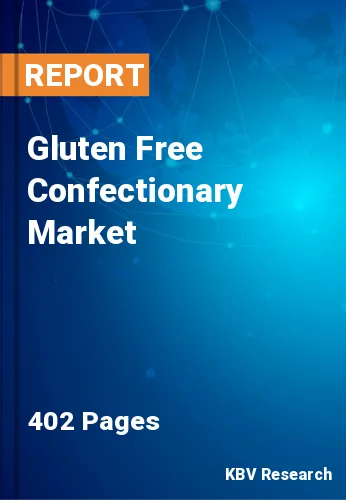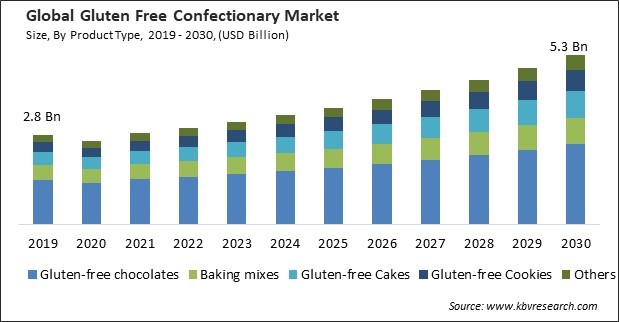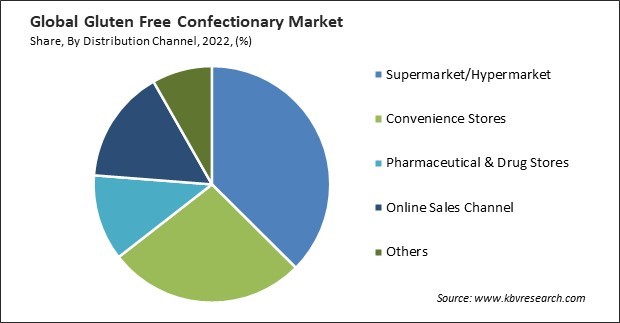
The Global Gluten Free Confectionary Market size is expected to reach $5.3 billion by 2030, rising at a market growth of 7.4% CAGR during the forecast period. In the year 2022, the market attained a volume of 2,68,806.8 tonnes, experiencing a growth of 4.2% (2019-2022).
Marketing campaigns directed at the benefits of gluten-free confectionary products, such as being suitable for individuals with gluten-related disorders or those seeking a healthier lifestyle, can raise consumer awareness. Thus, the Online Sales Channel segment would capture nearly 20% share in the market by 2030. Marketing can also educate consumers about reading product labels to identify gluten-free options. Clear labeling and branding strategies can help consumers make informed choices, leading to increased sales of gluten-free confectionary products. Some of the factors impacting the market are rise in celiac disease and gluten sensitivity cases, advancements empowering manufacturers to formulate gluten free confectioneries and premium pricing for gluten free confectioneries.

People with gluten intolerance are often highly concerned about gluten cross-contamination. They seek certified gluten-free products, including confectionary, to ensure they can enjoy indulgent treats without compromising their health. Improved awareness of celiac disease and non-celiac gluten sensitivity has led to more accurate and timely diagnoses. As healthcare professionals become better equipped to identify these conditions, more individuals are being informed about their gluten-related dietary restrictions. The increasing prevalence of gluten-related disorders has spurred innovation in gluten-free confectionary. As a result, the market demand is expected to proliferate in the upcoming years. Additionally, advances in ingredient sourcing and processing have played a pivotal role in elevating the quality of gluten-free options in the food industry, including gluten-free confectionary. These developments have transformed gluten-free products from mere substitutes to high-quality alternatives that closely match their gluten-containing counterparts' taste, texture, and sensory experience. One of the key advancements is the sourcing of gluten-free flour and starches. This ensures that gluten-free confectionary delivers the desired mouthfeel and sensory experience. Therefore, the demand is expected to rise in the market in the future.
However, Gluten-free ingredients, especially specialty flours and binding agents, can be more costly than their gluten-containing counterparts. This can increase production costs, resulting in premium pricing for gluten-free confectionary products. Price sensitivity among consumers may limit their purchasing frequency. Achieving the desired texture and taste in gluten-free confectionary can be challenging. Moreover, for individuals on limited budgets, the higher cost of gluten-free confectionary products may make them less affordable. This can impact the ability of some consumers to incorporate gluten-free options into their diets. Owing to these factors, there will be a decreased demand in the market.
Based on distribution channel, the market is segmented into supermarket/hypermarket, convenience stores, pharmaceutical & drug stores, online sales channel, and others. In 2022, the convenience stores segment garnered a substantial revenue share in the market. Advances in ingredient sourcing have led to the availability of high-quality gluten-free flours, starches, and binding agents. These ingredients are used to create confections that meet gluten-free standards while maintaining the integrity of the products. The confectionary segment includes various products such as chocolates, gummies, hard candies, marshmallows, and more. This diversity caters to different tastes and occasions, expanding the consumer base.

Based on price point, the market is segmented into economy, mid-range, and luxury. The economy segment acquired the maximum revenue share in the market in 2022. Gluten-free confectioneries in the economy segment are priced competitively, making them accessible to a broader consumer base, including budget-conscious shoppers and families. Consumers actively seek gluten-free options as awareness of gluten-related disorders and dietary preferences grows. This increased demand for gluten-free products extends to the economy segment. As a result, these factors will help expand the convenience stores segment.
By product type, the market is divided into gluten-free cookies, gluten-free cakes, gluten-free chocolates, baking mixes, and others. In 2022, the gluten-free cookies segment procured a significant revenue share in the market. Gluten-free cookies are now widely available in both mainstream grocery stores and specialty health food stores. This increased retail presence makes it easier for consumers to access gluten-free cookies and incorporate them into their snack routines. Gluten-free labeling and certification standards give consumers confidence in gluten-free cookies' safety.
| Report Attribute | Details |
|---|---|
| Market size value in 2022 | USD 3 Billion |
| Market size forecast in 2030 | USD 5.3 Billion |
| Base Year | 2022 |
| Historical Period | 2019 to 2021 |
| Forecast Period | 2023 to 2030 |
| Revenue Growth Rate | CAGR of 7.4% from 2023 to 2030 |
| Number of Pages | 402 |
| Number of Table | 770 |
| Quantitative Data | Volume in Kilo Tonnes, Revenue in USD Million, and CAGR from 2019 to 2030 |
| Report coverage | Market Trends, Revenue Estimation and Forecast, Segmentation Analysis, Regional and Country Breakdown, Companies Strategic Developments, Company Profiling |
| Segments covered | Product Type, Distribution Channel, Price Point, Region |
| Country scope | US, Canada, Mexico, Germany, UK, France, Russia, Spain, Italy, China, Japan, India, South Korea, Singapore, Malaysia, Brazil, Argentina, UAE, Saudi Arabia, South Africa, Nigeria |
| Growth Drivers |
|
| Restraints |
|
On the basis of region, the market is divided into North America, Europe, Asia Pacific, and LAMEA. The Europe segment attained the largest revenue share in the market in 2022. Celiac disease and gluten sensitivity are not uncommon in Europe. This high prevalence of gluten-related disorders has led to a significant demand for gluten-free products, including confectionary. Many European consumers are either diagnosed with these conditions or follow gluten-free diets as a preventive measure. European countries have stringent regulations on food labeling and allergen disclosure. Clear and standardized labeling practices have contributed to the growth of the market in Europe. As a result, there will be an increased demand in the Europe segment in the upcoming years.
Free Valuable Insights: Global Gluten Free Confectionary Market size to reach USD 5.3 Billion by 2030
The market research report covers the analysis of key stake holders of the market. Key companies profiled in the report include Conagra Brands, Inc., Mondelez International, Inc., King Arthur Baking Company, Inc., Bob's Red Mill Natural Foods, Inc., Simple Mills, Inc., Hail Merry LLC, The GFB, SmartSweets Inc. (TPG Inc.), Quinoa Corporation (Ancient Harvest) and Unreal Brands Inc.
By Product Type (Volume, Tonnes, USD Million, 2019-2030)
By Distribution Channel (Volume, Tonnes, USD Million, 2019-2030)
By Price Point (Volume, Tonnes, USD Million, 2019-2030)
By Geography (Volume, Tonnes, USD Million, 2019-2030)
The Market size is projected to reach USD 5.3 billion by 2030.
Rise in celiac disease and gluten sensitivity cases are driving the Market in coming years, however, Premium pricing for gluten free confectioneries restraints the growth of the Market.
Conagra Brands, Inc., Mondelez International, Inc., King Arthur Baking Company, Inc., Bob's Red Mill Natural Foods, Inc., Simple Mills, Inc., Hail Merry LLC, The GFB, SmartSweets Inc. (TPG Inc.), Quinoa Corporation (Ancient Harvest) and Unreal Brands Inc.
In the year 2022, the market attained a volume of 2,68,806.8 tonnes, experiencing a growth of 4.2% (2019-2022).
The Supermarket/Hypermarket segment is leading the Market, by Distribution Channel in 2022; thereby, achieving a market value of $1.8 billion by 2030.
The Europe region dominated the Market, by Region in 2022, and would continue to be a dominant market till 2030; thereby, achieving a market value of $1.8 billion by 2030.
Our team of dedicated experts can provide you with attractive expansion opportunities for your business.
